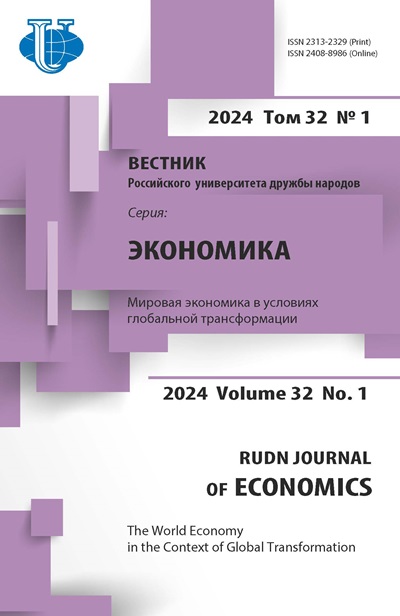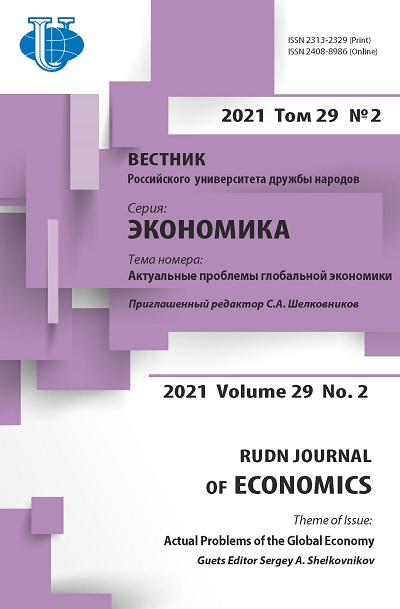Structural-content model of the territories marketing system as a direction of the socio-economic policy of the state
- Authors: Antonov V.N.1
-
Affiliations:
- Donetsk National University of Economics and Trade named after M. Tugan-Baranovskiy
- Issue: Vol 29, No 2 (2021): ACTUAL PROBLEMS OF THE GLOBAL ECONOMY
- Pages: 384-401
- Section: Industrial organization markets
- URL: https://journals.rudn.ru/economics/article/view/26897
- DOI: https://doi.org/10.22363/2313-2329-2021-29-2-384-401
Cite item
Full Text
Abstract
The article is devoted to the development of a structural-meaningful model of the territory marketing system as a direction of the state's socio-economic policy. At the same time, it is substantiated that the territory marketing system belongs to the category of open and is influenced by: systems of higher levels (for example, the economic security of the state); existing or potential financial and investment, material and resource, intellectual and personnel, digital development of territories, which, in fact, largely determines the capabilities of the state in the implementation of socio-economic policy and the choice by the authorities of tools for marketing territories; traditions, lifestyle and mentality of the population. Based on this, the signs and consequences of an insufficiently effective socio-economic policy in connection with its key directions are identified, and the features of the implementation of its main mechanisms are identified, in relation to the marketing of territories within the framework of the proposed structural and substantial model.
About the authors
Vladimir N. Antonov
Donetsk National University of Economics and Trade named after M. Tugan-Baranovskiy
Author for correspondence.
Email: irinaangelina5566@gmail.com
Candidate of Economic Sciences, Associate Professor Deputy Chairman of the Government of the Donetsk People’s Republic.
31 Shchorsa St, Donetsk, 283050, Donetsk People's RepublicReferences
- Angelina, I.A., & Solodkij, E.A. (2017). Theoretical aspects and features of territory marketing. Trade and Market, 2(3), 50-56. (In Russ.)
- Belenko, O.F., & Pikhanova, S.A. (2019). Branding in the territory marketing system. Branding in the Territory Marketing System, 3(101), 90-95. (In Russ.)
- Bulina, A.O., Mozgovaja, K.A., & Pakhnin, M.A. (2020). Human capital in the theory of economic growth: Classical models and new approaches. Bulletin of St. Petersburg University. Economy, (2), 163-168. (In Russ.)
- Butova, T.G., Krotova, I.V., Demakova, E.A., Iakovleva, E.Iu., & Morgun, V.N. (2020). Approaches to modelling territorial brand. Journal of Siberian Federal University. Humanities & Social Sciences, 13(4), 464-476.
- Charykova, O.G., & Markova, E.S. Regional clustering in the digital economy. Economy of the Region, (2), 409-419. (In Russ.)
- Dolgikh, U.O. (2020). Evolution of territorial marketing: world experience and prospects for Russia. Skif, 1(41), 381-389. (In Russ.)
- Dudkina, E.P. (2016). Territory marketing as a tool to ensure competitive development. Regional Aspects of the Development of Productive Forces, (21), 9-13. (In Russ.)
- Firsova, I.A., & Vodoleeva, I.A. (2020). Marketing of the territory in resolving regional contradictions. Greater Eurasia: Development, Security, Cooperation, (3-1), 953-957. (In Russ.)
- Galuckij, G.M. (2013). Economic theories and culture. Bulletin of MGUKI, 1(51), 228-232. (In Russ.)
- Gigch, J.P. van. (1981). Applied general theory of systems. Moscow, Mir Publ. (In Russ.)
- Glazev, S.Ju., & Fetisov, G.G. (2013). On the strategy for the sustainable development of the Russian economy. Economic and Social Changes: Facts, Trends, Forecast, 1(25), 23-35. (In Russ.)
- Khorohova, E.V., & Koljasnikov, V.A. (2020). Updating models of marketing strategies in the formation of the architectural and spatial environment of cities. Bulletin of SUSU. Series: Construction and Architecture, 20(1), 5-13. (In Russ.)
- Kornilova, K.S. (2019). Territorial branding as a tool for regional development (on the example of the Republic of Crimea). Questions of Theory and Practice of Journalism, (2), 388-403. (In Russ.)
- Naumov, S.V., & Ermolenko, A.A. (2020). Category of place in the modern theory of economic space. Spatial Economics, (2), 101-123. (In Russ.)
- Nyrov, B.F. (2019). The role and importance of marketing in managing the development of the territory. Bulletin of the Expert Council, 3(18), 28-31.(In Russ.)
- Ogarkova, I.V., & Sargaeva, E.S. (2020). Analysis of factors affecting the image of the region. Scientific Result. Business and Service Technologies, (2), 41-51. (In Russ.)
- Ovchinnikov, V.N., Ketova, N.P., & Druzhinin, A.G. (2019). Market development and structurization of the economic space of the region. Space of Economics, (2), 77-95 (In Russ.)
- Pivneva, E.A. (2020). Yugra as a brand: In search of regional identity. Bulletin of Ugric Studies, (1), 140-148. (In Russ.)
- Plisetskiy, E.L., & Plisetskiy, E.E. (2020). Infrastructural potential of the territory as a factor of sustainable regional development. Issues of State and Municipal Management, (3), 165-186. (In Russ.)
- Plotnikov, A.V. (2020). Mechanism of financial support for social and economic development projects. Theory and Practice of Service: Economics, Social Sphere, Technology, 1(43), 18-22. (In Russ.)
- Popov, V.P. (2016). Myths of economic theories. Topical Issues of Economic Sciences, (50-1), 16-29. (In Russ.)
- Romanko, I.E. (2019). Territory marketing as a factor in the modernization of the economy and the formation of a favorable image of the territory. Social and Humanitarian Knowledge, (12), 113-121. (In Russ.)
- Starikova, M.S., Ponomarev, I.N., Dadalova, M.V., & Ponomareva, T.N. (2019). Problems and ways to improve marketing of territories of advanced development. Scientific Statements of Belgorod State University. Series: Economics. Computer Science, (4), 609-620. (In Russ.)
- Stockaja, T.G. (2020). The phenomenon of rationality in economic theory. Fundamentals of ECU, 1(20), 44-47. (In Russ.)
- Studzieniecki, T., Jakubowski, A., & Meyer, B. (2020). Transnational tourist destination management: A case study of the Baltic Sea region. Baltic Region, 12(3), 127-146.
- Ugurchieva, R.O., & Musaev, M.M. (2020). The role of state institutions in the implementation of regional socio-economic policy. EGI, 1(27), 210-215. (In Russ.)
- Usmanova, Z.R., Shashenkov, A.O., & Voropanov, S.A. (2020). Risks of reforming state social and economic policy in modern Russia. Power, (4), 17-23. (In Russ.)
- Vazhenina, I.S., & Vazhenin, S.G. (2020). Competitive cooperation of territories in the modern economic space. Economy of the Region, (2), 406-419. (In Russ.)















